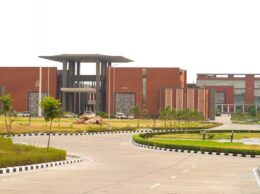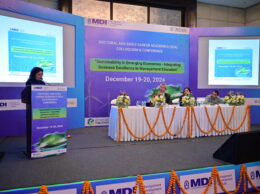New York, 15th May 2018: On May 11, 2018, Peking University’s Guanghua School of Management hosted its fifth annual New York Forum at the New York Public Library in Manhattan. This year’s Forum, themed “Investing in a Better World,” brought together leading academics from China and the US to discuss the roles each of these countries play in the global economy, as well as the impact technology being pioneered by the US and China is having on human progress and economic development. The event attracted 250 participants from academia, industry, and government.
The 2018 Peking University Guanghua New York Forum coincided with Peking University’s 120th anniversary and served as a significant piece of the University’s overseas celebrations. To mark this critical moment in the University’s history, Vice President WANG Bo opened the Forum program by discussing the close relationship between Peking University’s history and China’s economic and social development. Vice President WANG indicated that protectionist attitudes are becoming increasingly common globally, presenting the world with new challenges to navigate. In a nod to the Forum’s topics of discussion, he also acknowledged the new challenges and opportunities that technological advances are creating for economic and social development.
In remarks welcoming Forum guests and addressing the tense economic relationship between China and the US, Stephen Kennedy Smith advocated for a vision of the world similar to that held by his uncle President John F. Kennedy—a vision rooted in the virtue of global citizenship. In his remarks, Mr. Kennedy Smith also acknowledged that China’s leaders have also called for a unified world. However, even as China’s rapid economic development has lifted millions out of poverty, both China and the US are grappling with income inequality, a key issue of sustainable economic development.
Dean LIU Qiao of Peking University’s Guanghua School of Management provided an overview of China’s economic activity, highlighting its success using an investment-led growth model focused on infrastructure and its willingness to becoming an active participant in global trade. Even as China is catching up to the US in terms of the number Fortune 500 companies counted in its ranks, Chinese companies have shown a much lower Return on Invested Capital (ROIC) than their US counterparts, translating to lower quality growth. China must now focus on striking a better balance between investment rate and ROIC. Moving to a sustainable model promoting quality growth is a key policy objective of China’s current leadership, and as the country tackles these challenges, it can serve as a reference point from which other emerging economies can learn.
Continuing on the theme of the global economy, Jeffrey Sachs, University Professor at Columbia University, emphasized that the current market economy framework is not meeting the needs of all citizenry since it does not produce fairness or environmental sustainability. Fairness, trust, and other measures of well-being should be considered along with productivity when addressing economic problems. Professor Sachs also warned against hubris that stems from being a powerful country, which is what led China to close its doors to the world several centuries ago and has led to expectations for eternal prosperity in the US during its 70 years as a superpower. Global problems can only be solved through cooperation, and universities must lead the way in establishing partnerships to solve challenges. Professor Sachs also commended the collaborative nature of China’s Belt and Road Initiative.
With technology driving the new economy, developments in artificial intelligence (AI) and the mobile economy being pioneered by the US and China have important implications for the impact of economic growth on society. MIT’s Max Tegmark shared background on the development of AI, with most AI researchers optimistic that Artificial General Intelligence (AGI) is possible within the next few decades. However, for AGI to become a positive engine for human progress and economic development, researchers must follow several principles. Specifically, they must avoid developing new ways of harming people and propel research that creates new ways of helping society, they must avoid AI-generated wealth inequality, and they must invest in AI safety research. As technology continues to develop, it should empower society, rather than overpower it.
Dean CAI Hongbin of the University of Hong Kong’s Faculty of Business and Economics gave further context to the state of AI research in China and the US before leading a dialogue with Professor Tegmark. The US has almost 1100 AI companies compared to China’s 600, and the US saw AI capital investment of $17 billion compared to $2.6 billion in China. However, China has more sources of data from which to pull and development of AI technology in China is catching up very quickly with the US in terms of AI-related publications and AI start-ups. Competition in AI research may not necessarily be a negative thing. When Dean CAI inquired about the benefits of AI, Professor Tegmark indicated that technological advancements often generate wide benefits that cannot be limited to a single group of people. For example, everyone enjoys the benefits of electricity without having to worry about who actually discovered it.
NYU’s Anindya Ghose shifted focus to the mobile economy and its impact on business and economic growth. Currently, the mobile economy represents 4% of world GDP, but it is expected to go up as a percentage. People are now doing many different activities in many different locations, and are using multiple devices, presenting a challenge for companies to identify the needs of consumers. However, coupling location data with other contextual data can help companies reach consumers and meet their needs. Blockchain technology can also be used to augment mobile technology to solve problems such as digital ad fraud.
PKU Guanghua Professor SHEN Qiaowei expounded on the development of the mobile economy in China where mobile payment penetration has already reached 77%. Consumers in Beijing can move around freely with just a mobile phone, able to pay for public transit, food, and other purchases using mobile wallets. The mobile economy has also driven the development of other industries in China, such as food delivery services. During Professor SHEN’s dialogue with Professor Ghose, Professor Ghose indicated that there are still some barriers to cross for society to see the full benefits of the mobile economy. In particular, as companies collect fuller profiles on consumers, it will be easier for them to target consumer needs. While many consumers are under the misconception that organizations harbor malicious intent, many companies are actually investing heavily in protecting consumer privacy, and blockchain technologies can be used for addressing inadvertent leaks of information.
Asia Society’s Vice President for Development and Partnerships Christine Davies provided a summary of the speakers’ viewpoints, sharing her optimism for cooperation between the United States and China, even as differences in viewpoints may remain.
Going forward, the Guanghua School of Management will endeavor to continue serving as a platform for the exchange of new thoughts, perspectives, and ideas that can help bridge China, the US, and the world.









